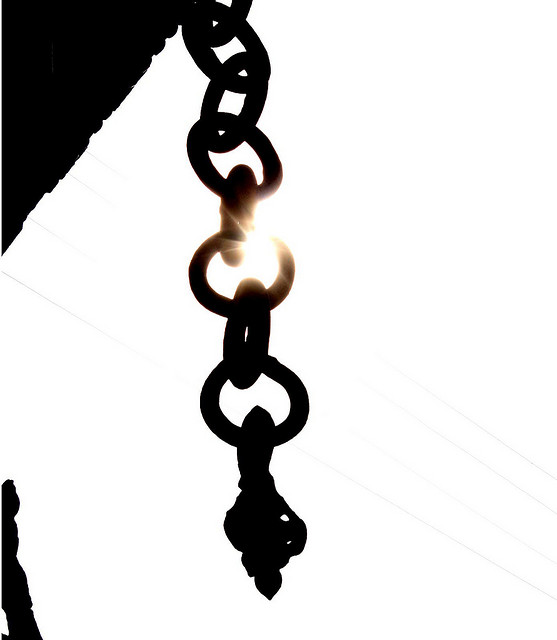Introduction: the Generations issue
by Rose Lemberg
Love doesn't sit there like a stone. It has to be made like bread; remade all the time, made new.
– Ursula K. Le Guin[1]

"Chained to Time". Image by Sudhamshu Hebbar.
For those who have been silenced, finding a voice to speak with is not a singular victory. If love and bread are made and made again, then voice is found and stifled – here, and gone; is heard, or is dismissed. Always, always it is emerging. It is a work in progress, a word in progress, a silence dormant waiting for the right breath. Often twined with pain, the voice that had been silenced cannot be assuaged by time. In this never-ending struggle to express what hurts the most, the poems of Stone Telling 2 are in dialogue with the first issue.
As this issue was coming together, I couldn’t figure out how to name it. Its heart, too close to me, eluded words. I tried out different things in my mind. “It’s about loss,” I would say. “It’s about continuity, and becoming. The heartbreak issue. The aftermath of loss. It is about memory. It is about women.”
And yes, Stone Telling 2 is all of those things; but most of all, this issue is about generations – the chain of linked selves, forged together, sometimes at odds with each other; nurtured and nurturing. When the chain breaks, we are broken.
Many poems in this issue are about that rupture. Eliza Victoria’s heart-wrenching “Archaeology” speaks of a mother who lost a child. The narrator of Mary Agner’s “Tertiary” finds herself alienated from the generational chain by her choice to take off her breasts: “No more woman, never mother, /no mere anything, anomaly.” The narrator of Erika Peterson “Swamp” loses her family in a Gulf Coast disaster – the survivor, unable to move on, can only bear witness.
And yet, even in loss, the continuity of generations upholds us. in Shweta Narayan’s "Palettes", the narrator and her mother “speak their love in quilts” – no trivial pastime, this difficult piecing must continue despite death and illness, continue into the future. The Grandmother Spider of Catherynne Valente’s poem would bring the sun back from the land of fire for those she loves, no matter the price.
The Generations issue focuses on women: they are daughters and mothers, they are grandmothers and great-granddaughters. Those we love are lost and found again, like words. We seek them, and shun them - the difficult truths. We choke and go on. Audre Lorde says,[2]
For women, then, poetry is not a luxury. It is a vital necessity of our existence. […] Poetry is the way we help give name to the nameless so it can be thought. The farthest external horizons of our hopes and fears are cobbled by our poems, carved from the rock experiences of our daily lives.Stone Telling 2 offers no easy reads, but I hope you will find these poems meaningful: a link in the chain of meanings we make together - ever changing, empowering us to speak the future.

